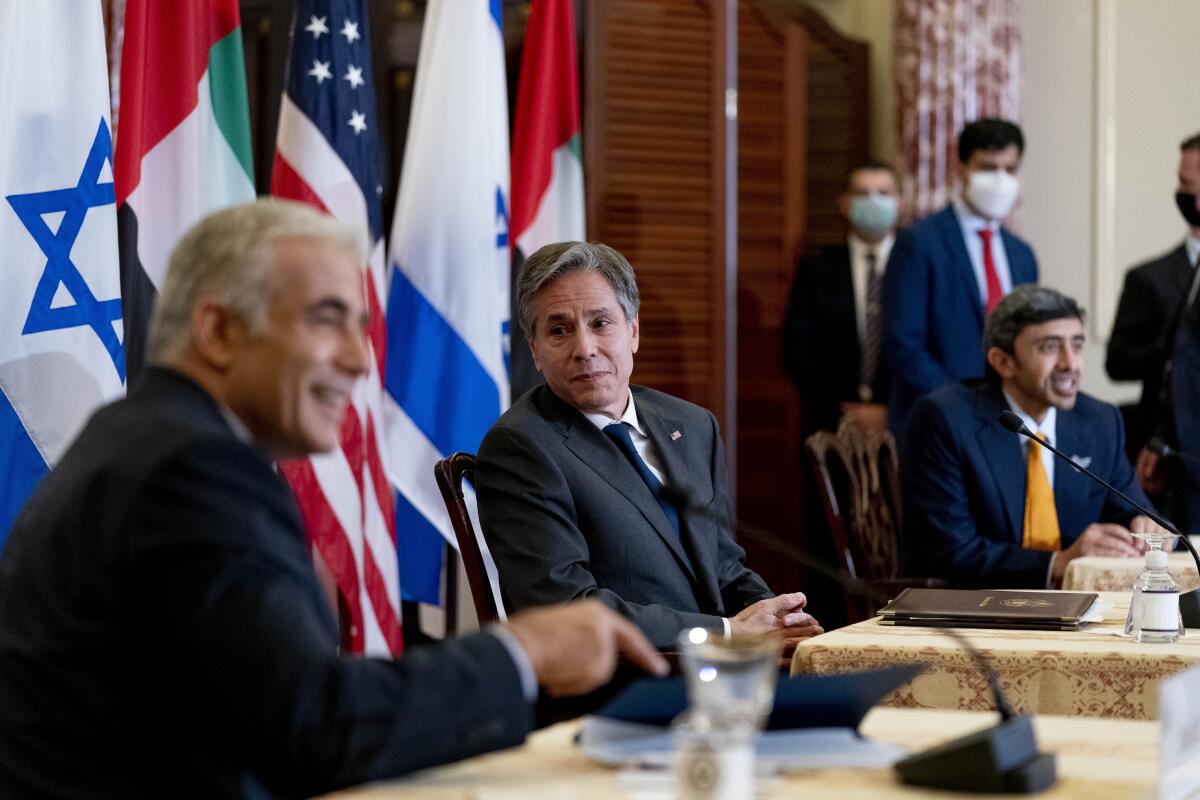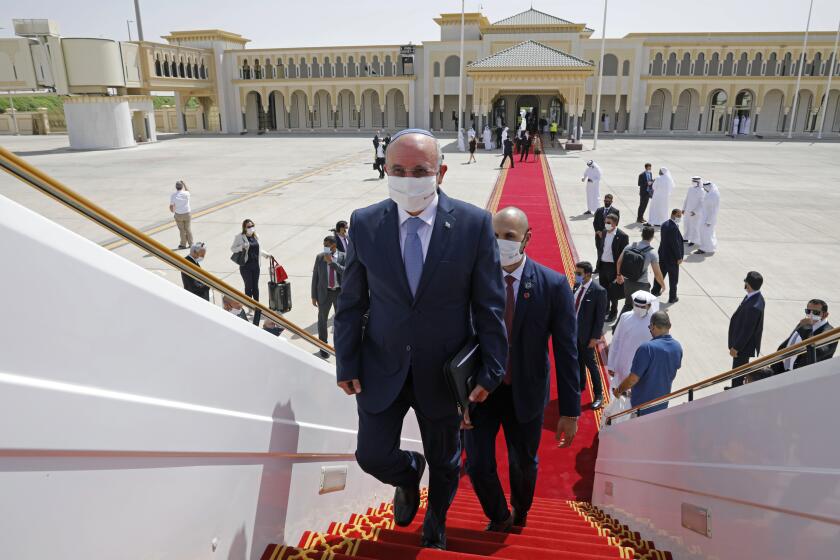Biden administration hosts Israel and UAE in move to build on Abraham accords

- Share via
WASHINGTON — The Biden administration is attempting to build on landmark accords that normalized relations between Israel and a handful of Arab or Muslim nations, but without leaving out the Palestinians, whose cause for statehood seems more distant than ever.
Secretary of State Antony J. Blinken on Wednesday hosted talks in Washington with his counterparts from Israel and the United Arab Emirates, Yair Lapid and Sheikh Abdullah bin Zayed al Nahyan, respectively.
“We believe strongly that Palestinians and Israelis deserve to live safely, securely, with equal measures of freedom, prosperity and democracy, and we will continue our own efforts toward that end,” which in turn fosters creation of a Palestinian state, Blinken said in a news conference with Lapid and Abdullah.
The three diplomats also discussed Iran’s failure thus far to return to the international nuclear deal from which the Trump administration withdrew as other nations in the pact tried to keep it alive. Blinken said the “runway” for reviving the deal in a way that controls Iran’s enrichment of nuclear materials “is getting shorter and shorter.”
Lapid reiterated that if diplomacy fails with Iran, Israel is prepared with alternatives. Israel is believed to have carried out clandestine attacks on Iranian sites.
The agreement between Israel and the handful of Arab nations, known as the Abraham accords, was brokered a year ago during the Trump administration in what the former president often claimed to be his greatest diplomatic achievement. In addition to the United Arab Emirates, Bahrain signed the agreement, followed by Sudan and Morocco, although their participation has been more limited.
Since the signing, Israel has been engaged in numerous business and tourism deals with the Emirates and Bahrain, while the U.S. agreed to sell F-35 stealth fighter jets to the Emiratis. An estimated 200,000 Israeli tourists visited the Emirates in the last year, the U.S. government says, and the two countries have exchanged ambassadors.
Blinken hailed “transformative partnerships” that are allowing the three Middle Eastern countries to create and deepen diplomacy and development projects in areas such as water use, climate change and trade.
Current and former administration officials insist other Arab and Muslim countries are ready to join, but there has been no such movement to date, especially from regional powers such as Saudi Arabia.
Although none of the signatories to the Abraham accords were engaged in war with Israel, they had not formally recognized the country. It was a major step for them to grant diplomatic recognition to Israel.
But left out in the cold were the Palestinians.
Arab states prefaced normalization with Israel on a deal giving Palestinians a state. But the United Arab Emirates’ and Bahrain’s moves change that.
Arab nations had long argued they would never develop ties with Israel as long as the question of Palestinian sovereignty remained unresolved. Arab signatories to the Abraham accords insisted that by joining they were able to stave off plans by Israel to annex large parts of the West Bank, which the Palestinians claim for a future state.
Yet, no progress — by the U.S. or regional powers — has been made on negotiations with the Palestinians. Washington has not reopened the U.S. Consulate in Jerusalem, a de facto embassy for the Palestinians, despite promises to do so.
The consulate was subsumed when President Trump moved the U.S. Embassy to Jerusalem from Tel Aviv in 2018 to criticism from international allies and outcry from the Palestinians, who have shunned the embassy because it broke decades of U.S. neutrality on competing claims over Jerusalem. And the Biden administration has not pushed back forcefully on expanding settlements.
The Abraham accords are “not a substitute for the two-state solution,” a senior State Department official said, “and we hope that normalization can be leveraged to advance progress on the Israeli-Palestine track.”
The official briefed reporters ahead of Wednesday’s meetings on condition of anonymity in keeping with government protocols.
“The Biden administration started out with a clear commitment to the two-state solution,” the official added. “We continue on with that commitment and we seek to advance it as we can, when we can, as best we can.”
It is unclear what leverage the Biden administration can apply to Israel, still the largest recipient of U.S. aid.
Lapid has been more receptive to Palestinian rights, but the new prime minister of Israel, Naftali Bennett, has said he opposes an independent Palestinian state.
“Our goal is to work with the Palestinian Authority to ensure that every child has that opportunity” to have “a decent way of life,” Lapid said in the news conference with Blinken.
Abdullah said he hoped the Palestinians and Israelis would see that regional cooperation is “the path,” because it brings stability, peace and economic prosperity.
Some Mideast experts have suggested the Biden administration has remained lukewarm on the Abraham accords. It is unclear why, they say, noting it could be because it was a Trump achievement or because current officials see only limited progress under the agreement.
“The Biden administration is rhetorically involved,” said Michael Koplow, policy director for the Israel Policy Forum, a pro-Israel U.S. group that also supports a Palestinian state. “But there is no evidence that they are enmeshed in finding out what needs to happen to get other countries involved or to bring in the Palestinians.”
President Biden and Blinken have had to tread a narrow line where they continue to evince that “unshakeable bond” the U.S. and Israel have, while also ending or fine-tuning some of the brazenly pro-Israel policies of the previous administration.
Some members of that administration — Trump’s son-in-law and daughter, Jared Kushner and Ivanka Trump, and former Secretary of State Michael R. Pompeo — were touring parts of Israel and environs this week to celebrate the first anniversary of the Abraham accords.
Pompeo reportedly visited Jewish settlements in the West Bank, considered illegal by much of the world, with former Prime Minister Benjamin Netanyahu, who recently lost reelection as he faced trial on corruption charges.
Pompeo also received the so-called Peace Through Strength Award from David Friedman, who was the previous administration’s ambassador to Israel.
More to Read
Get the L.A. Times Politics newsletter
Deeply reported insights into legislation, politics and policy from Sacramento, Washington and beyond. In your inbox twice per week.
You may occasionally receive promotional content from the Los Angeles Times.












